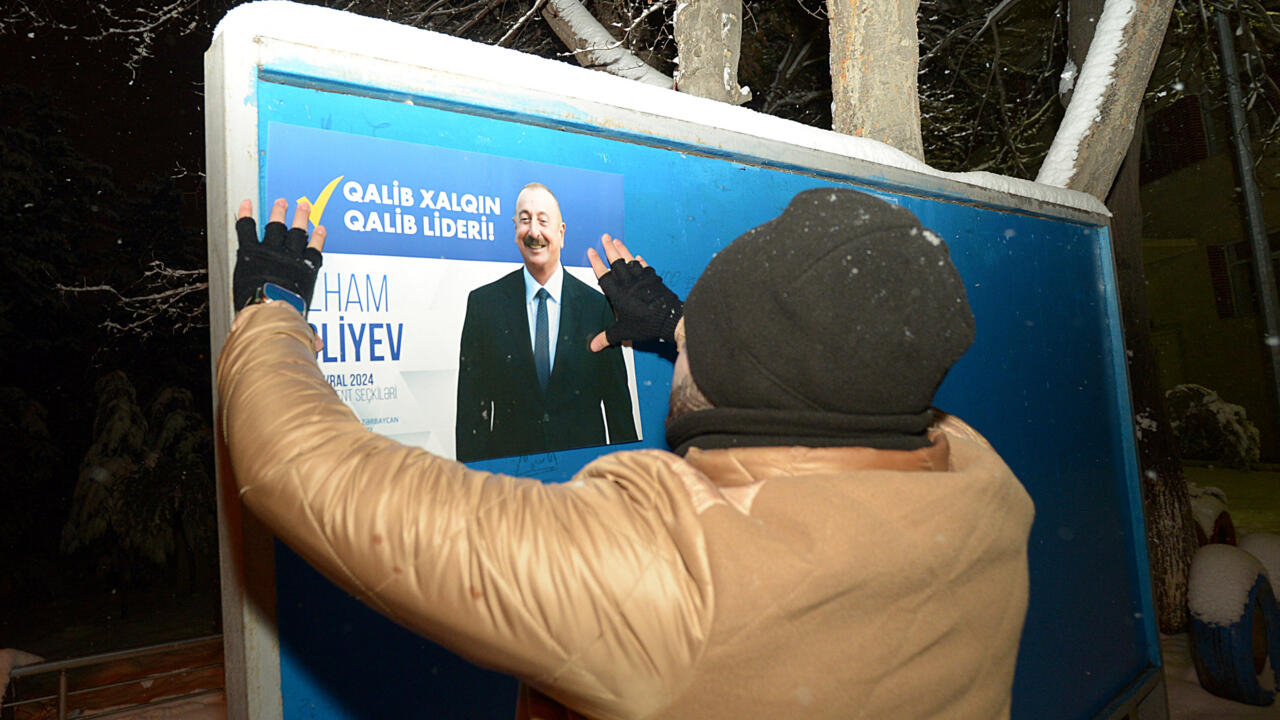

Azerbaijani President Ilham Aliyev is expected to secure a fifth consecutive term in presidential elections on February 7. Anita Khachaturova, a specialist in Armenia-Azerbaijan relations, talks to FRANCE 24 about what is at stake.
Issued on:
3 min
Advertising
Azerbaijan’s President Ilham Aliyev, who has been at the helm of the country for more than 20 years after succeeding his father, is standing for re-election in the February 7 presidential election. The 62-year-old autocrat is hoping to secure a fifth consecutive term as leader of this small, hydrocarbon-rich Caucasus country. It would be his second seven-year term since the country’s 2016 constitutional reform, which extended the presidential term from five to seven years.
President Aliyev secured 86 percent of the vote in the 2018 elections that the Organization for Security and Co-operation in Europe described as lacking in “genuine competition” and taking place in a “restrictive political environment”.
Aliyev published a decree in December 2023 announcing that he was bringing the 2025 elections forward to February 7, 2024.
FRANCE 24 takes a look at the stakes of this snap presidential election with Anita Khachaturova, a researcher at the Free University of Brussels specialising in Armenia-Azerbaijan relations.
FRANCE 24: Has Aliyev become more powerful since the last elections?
Anita Khachaturova: Since the 2018 election, there has been the war in Nagorno-Karabakh and Azerbaijan has taken over the entire territory, which had been a source of dispute with Armenia since the late 1980s. Part of the territory had already been taken over in 2020. The rest was taken over a few months ago in September 2023, forcing the Armenians living there to leave in what amounts to ethnic cleansing.
This is a key, symbolic victory for President Aliyev, who touts himself as the man who has restored dignity to the Azerbaijani people and washed away the affront of humiliation and occupation inflicted on Azerbaijan by the Armenians. The victory in Nagorno-Karabakh has given new legitimacy to the president’s position in the eyes of the Azerbaijani people, who view him as a providential figure who has restored Azerbaijan’s territorial integrity.
However, it is important to understand the particular nature of Azerbaijan’s political system when discussing the February elections. Azerbaijan is a highly repressive autocracy. The NGO Freedom House (which works to defend human rights and promote democratic change) ranks Azerbaijan among the worst states in terms of political rights and freedoms. The elections in Azerbaijan are not like those observed in democratic countries, European or otherwise. They are simply a plebiscite in favour of the president giving him a kind of political legitimacy on the international scene, but very little democratic legitimacy.
Aliyev inherited power in 2003 after his father died. The latter had governed the country since 1993 and was head of the KGB in Soviet Azerbaijan in the 1960s. As such, this family has ruled the country almost without interruption since the late 1960s. It operates as a clan system, running the country like a business. All the country’s resources are monopolised by this family and those close to it.
Why have the presidential elections been brought forward to February?
On the strength of the victory in Nagorno-Karabakh – a victory that President Aliyev personally claims – these early elections may be perceived, from the outside, as a desire to consolidate his popular support, which he likely does have. (The war in Nagorno-Karabakh is not met with much opposition, even from among the regime’s critics, with the exception of a handful of pro-peace activists who are extremely marginalised.) But this popularity is difficult to assess or estimate independently, given the political context in Azerbaijan.
Aliyev has maintained a steady policy of making threats and annexationist statements against Armenia, and his re-election may also serve to support future military campaigns against Armenian sovereignty. It is also accompanied by the extreme repression of the few independent journalists and activists who, by raising societal problems in the country, are seen as tarnishing the victory in Nagorno-Karabakh.
Read moreForbidden Stories continues work of imprisoned Azerbaijani journalists
Is there any opposition to the presidential candidate in this election?
There is no opposition, no freedom of the press or even political opponents, as such. The presidential campaign is a dramatisation. We saw this recently, for example, during the debates held on Azerbaijani television, which were mocked by the population, particularly on social media.
This election has very little credibility. The outcome of the vote is all but certain. We know that Aliyev will be re-elected.
This article has been translated from the original in French.
EMEA Tribune is not involved in this news article, it is taken from our partners and or from the News Agencies. Copyright and Credit go to the News Agencies, email [email protected] Follow our WhatsApp verified Channel









